Old Testament
Genesis Exodus Leviticus Numbers Deuteronomy Joshua Judges Ruth 1 Samuel 2 Samuel 1 Kings 2 Kings 1 Chronicles 2 Chronicles Ezra Nehemiah Esther Job Psalms Proverbs Ecclesiastes Song of Solomon Isaiah Jeremiah Lamentations Ezekiel Daniel Hosea Joel Amos Obadiah Jonah Micah Nahum Habakkuk Zephaniah Haggai Zechariah MalachiJob 40:8 Similar Verses
Job 40:8 Cross References
Wilt thou also disannul my judgment? wilt thou condemn me, that thou mayest be righteous?
Uncover the Rich Themes and Topics of This Bible Verse
Listed below are the Bible themes associated with Job 40:8. We invite you to explore each theme to gain deeper insights into the Scriptures.
Job 40:8 Cross Reference Verses
This section features a detailed cross-reference designed to enrich your understanding of the Scriptures. Below, you will find carefully selected verses that echo the themes and teachings related to Job 40:8 KJV. Click on any image to explore detailed analyses of related Bible verses and uncover deeper theological insights.
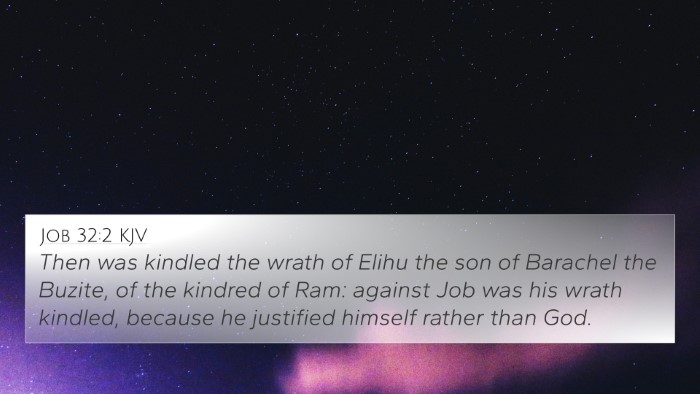
Job 32:2 (KJV) »
Then was kindled the wrath of Elihu the son of Barachel the Buzite, of the kindred of Ram: against Job was his wrath kindled, because he justified himself rather than God.

Isaiah 28:18 (KJV) »
And your covenant with death shall be disannulled, and your agreement with hell shall not stand; when the overflowing scourge shall pass through, then ye shall be trodden down by it.
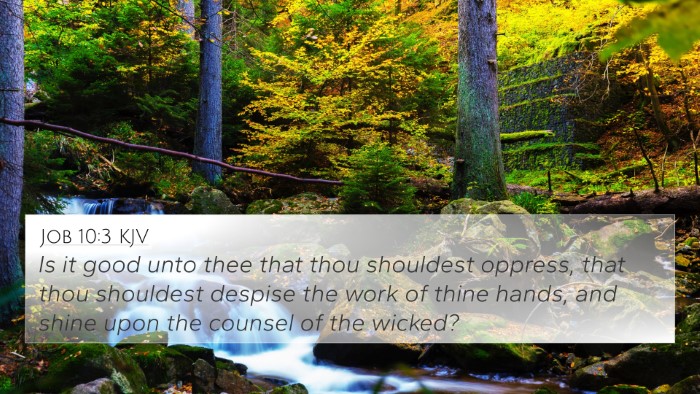
Job 10:3 (KJV) »
Is it good unto thee that thou shouldest oppress, that thou shouldest despise the work of thine hands, and shine upon the counsel of the wicked?
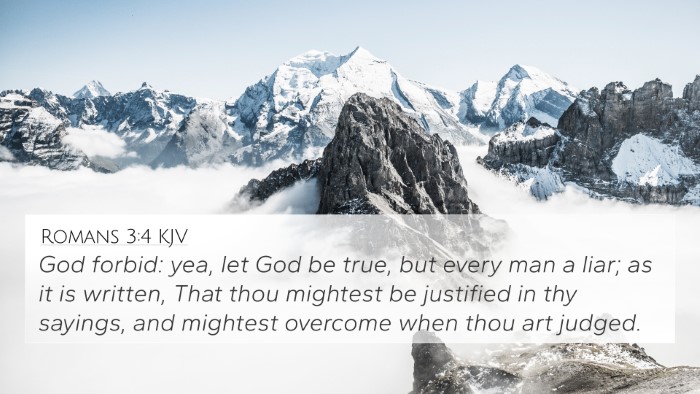
Romans 3:4 (KJV) »
God forbid: yea, let God be true, but every man a liar; as it is written, That thou mightest be justified in thy sayings, and mightest overcome when thou art judged.
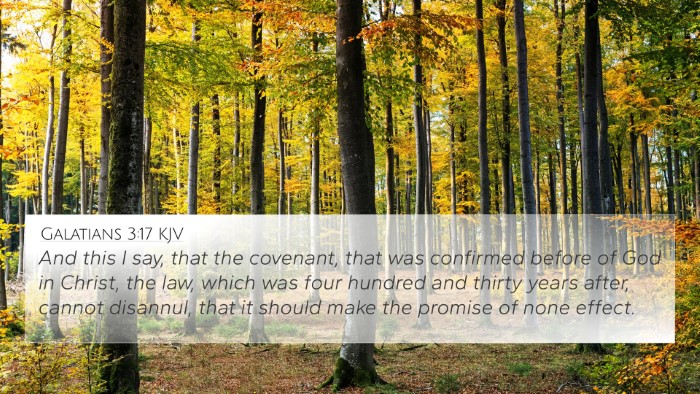
Galatians 3:17 (KJV) »
And this I say, that the covenant, that was confirmed before of God in Christ, the law, which was four hundred and thirty years after, cannot disannul, that it should make the promise of none effect.

Galatians 3:15 (KJV) »
Brethren, I speak after the manner of men; Though it be but a man's covenant, yet if it be confirmed, no man disannulleth, or addeth thereto.

Isaiah 14:27 (KJV) »
For the LORD of hosts hath purposed, and who shall disannul it? and his hand is stretched out, and who shall turn it back?

Job 35:2 (KJV) »
Thinkest thou this to be right, that thou saidst, My righteousness is more than God's?
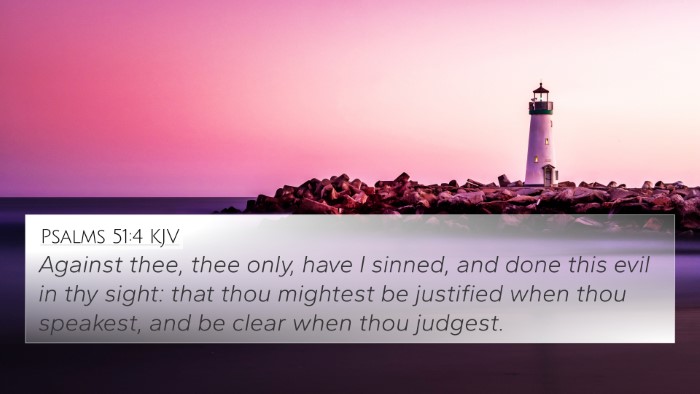
Psalms 51:4 (KJV) »
Against thee, thee only, have I sinned, and done this evil in thy sight: that thou mightest be justified when thou speakest, and be clear when thou judgest.

Job 27:2 (KJV) »
As God liveth, who hath taken away my judgment; and the Almighty, who hath vexed my soul;
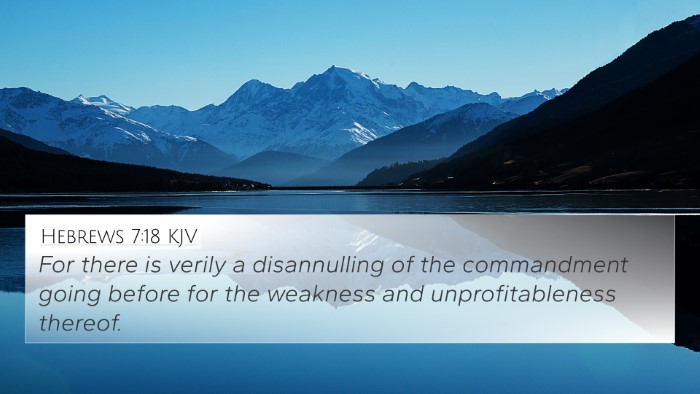
Hebrews 7:18 (KJV) »
For there is verily a disannulling of the commandment going before for the weakness and unprofitableness thereof.
Job 40:8 Verse Analysis and Similar Verses
Understanding Job 40:8
Job 40:8 states: "Would you discredit my justice? Would you condemn me to justify yourself?" This profound question posed by God to Job invites a deep exploration of divine justice, human suffering, and the nature of God’s authority.
Summary of Insights
In this verse, we find God challenging Job's understanding of righteousness and justice. It speaks to the larger themes of God's sovereignty and mankind's limited perspective. The verse is essential for grasping the complexities of suffering, divine wisdom, and the human condition.
Theological Analysis
This verse serves as a pivotal moment in the Book of Job, repurposing Job's understanding of suffering and reorienting him towards a more profound respect for God's infinite wisdom. Commentators like Matthew Henry, Albert Barnes, and Adam Clarke offer rich insights into its significance.
- Matthew Henry: Emphasizes that Job’s outcry against God’s justice should not lead to his condemnation, for humanity cannot fully grasp divine reasoning.
- Albert Barnes: Highlights that Job’s question regarding justice reflects a deeper misunderstanding of God’s purpose and the mystery of divine providence.
- Adam Clarke: Points out that God is asserting His authority and that it is not for man to question the righteousness of God’s ways.
Key Themes
Here are some key themes related to Job 40:8 that resonate throughout Scripture:
- Divine Sovereignty: God retains ultimate control over the universe and holds the authority to judge human actions.
- Human Fragility: Humans often struggle to comprehend God's will, leading to questioning and doubt.
- Justice and Mercy: This verse contrasts the human desire for justice with God’s deeper, often inscrutable, mercy.
Bible Verse Cross-References
There are several Bible verses that are interconnected with Job 40:8. Understanding these connections deepens the comprehension of God’s message throughout Scriptures:
- Romans 9:20-21 - Discusses the relationship between the Creator and creation.
- Isaiah 45:9 - Questions the clay's right to question the potter.
- Psalms 94:7-8 - Addresses the folly of presumptuous questioning against God.
- Proverbs 21:30 - Admits that human wisdom cannot stand against God’s plan.
- Job 10:2 - Job’s plea reflects the desire for a fair hearing before God.
- Ecclesiastes 7:14 - Points to the inscrutability of God’s providence in times of adversity.
- Romans 11:33 - Highlights the depth of God’s wisdom and the inaccessibility of His judgments.
Comparative Bible Verse Analysis
In comparative studies between Job’s challenges and other biblical texts, one notes the following connections:
- Inter-Biblical Dialogue: Job’s struggles echo in the New Testament, particularly in Jesus' suffering, where divine justice is also questioned (Matthew 27:46).
- Thematic Connections: The theme of divine justice surfaces in between Job and various Psalms that portray the righteous judgment of God.
Tools for Bible Cross-Referencing
For those interested in exploring themes and connections further, several tools are available:
- Bible concordance
- Bible cross-reference guide
- Bible reference resources
- Cross-reference Bible study materials
How to Use Bible Cross-References
Identifying cross-references in the Bible can enhance understanding of themes and teachings:
- Start by noting phrases or concepts repeated throughout different passages.
- Utilize biblical study resources like a comprehensive Bible cross-reference system or biblical study software.
- Engage in thematic studies that compare how various books approach similar ideas.
Conclusion
Job 40:8 invites believers to reflect on their understanding of justice, the complexities of divine action, and the humble acknowledgment of God’s high and unsearchable wisdom. The interconnectedness of this verse with other scriptures illustrates the rich tapestry of biblical theology and the ongoing dialogue between God's sovereignty and human inquiry.



